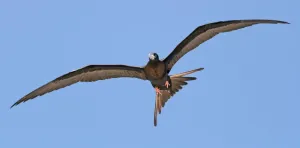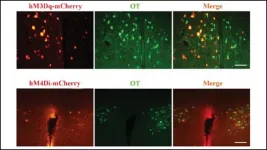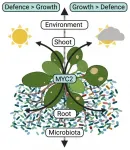INFORMATION:
The research team included the RSPB and the Royal Netherlands Institute for Sea Research.
The study was funded by UK Government's Conflict, Security and Stability Fund and by a Darwin Initiative grant.
The paper, published in the journal Proceedings of the National Academy of Sciences, is entitled: "Direct evidence of a prey depletion 'halo' surrounding a pelagic predator colony."
Seabird colony creates 'halo' of depleted fish stocks
2021-07-05
(Press-News.org) A vast seabird colony on Ascension Island creates a "halo" in which fewer fish live, new research shows.
Ascension, a UK Overseas Territory, is home to tens of thousands of seabirds - of various species - whose prey incudes flying fish.
The new study, by the University of Exeter and the Ascension Island Government, finds reduced flying fish numbers up to 150km (more than 90 miles) from the island - which could only be explained by the foraging of seabirds.
The findings - which provide rare evidence for a long-standing theory first proposed at Ascension - show how food-limited seabird populations naturally are, and why they are often so sensitive to competition with human fishers.
"This study tells us a lot about large colonies of animals and how their numbers are limited," said Dr Sam Weber, of the Centre for Ecology and Conservation on Exeter's Penryn Campus in Cornwall.
"These birds are concentrated at Ascension Island during the breeding season, and the intensity of their foraging is naturally highest near the island.
"As they use up the most accessible prey located near to the island, they have to travel increasingly long distances to feed, causing the 'halo' to expand outwards.
"Once individuals can't find enough food to break even with the energy they expend finding it, the colony stops growing.
"Human impacts such as fisheries can interfere with this natural balance and have negative effects on populations of marine top predators like seabirds, even if they don't directly harm the birds.
"What was particularly surprising is the large scale of the footprint we found.
"It shows that Marine Protected Areas may need to be very large because some predators rely on prey stocks across a huge area."
The pattern of prey depletion revealed by the study is known as "Ashmole's halo", after British ornithologist Philip Ashmole, who first proposed it about 60 years ago after a visit to Ascension Island.
For the study, the researchers counted flying fish, tracked seabirds' foraging trips and examined their regurgitated food.
The nesting seabird species on Ascension that prey on flying fish include frigatebirds, masked boobies and brown boobies.
ELSE PRESS RELEASES FROM THIS DATE:
Nanomaterials shape and form influences their ability to cross the blood brain barrier
2021-07-05
Nanomaterials found in consumer and health-care products can pass from the bloodstream to the brain side of a blood-brain barrier model with varying ease depending on their shape - creating potential neurological impacts that could be both positive and negative, a new study reveals.
Scientists found that metal-based nanomaterials such as silver and zinc oxide can cross an in vitro model of the 'blood brain barrier' (BBB) as both particles and dissolved ions - adversely affecting the health of astrocyte cells, which control neurological responses.
But the researchers also believe that their discovery will help to design safer nanomaterials and could open ...
The same neural pathways promote maternal and paternal behaviors in voles
2021-07-05
Like female voles, connections between oxytocin neurons in the hypothalamus and dopamine neurons in reward areas drive parental behaviors in male voles, according to new research published in JNeurosci.
Motherhood receives most of the attention in the research world, yet in 5% of mammals -- including humans -- fathers provide care, too. The "love hormone" oxytocin plays a role in paternal care, but the exact neural pathways underlying the behavior were not known.
He et al. measured the neural activity of vole fathers while they interacted with their offspring. Oxytocin neurons connecting the hypothalamus to a reward area fired when the fathers cared for their offspring. ...
Psychedelic spurs growth of neural connections lost in depression
2021-07-05
The psychedelic drug psilocybin, a naturally occurring compound found in some mushrooms, has been studied as a potential treatment for depression for years. But exactly how it works in the brain and how long beneficial results might last is still unclear.
In a new study, Yale researchers show that a single dose of psilocybin given to mice prompted an immediate and long-lasting increase in connections between neurons. The findings are published July 5 in the journal Neuron.
"We not only saw a 10% increase in the number of neuronal connections, but also they were on average about 10% larger, so the connections were stronger as well," said Yale's Alex Kwan, associate professor of psychiatry and of neuroscience and senior author of the paper.
Previous ...
Global BECCS potential is largely constrained by sustainable irrigation
2021-07-05
A new collaborative research led by researchers from the National Institute for Environmental Studies, Potsdam Institute for Climate Impact Research, Ritsumeikan University, and Kyoto University found that although unlimited irrigation could increase global BECCS potential (via the increase of bioenergy production) by 60-71% by the end of this century, sustainably constrained irrigation would increase it by only 5-6%. The study has been published in Nature Sustainability on July 5.
Bioenergy with carbon capture and storage (BECCS) is a process of extracting bioenergy from biomass, ...
Astronomers discover an oversized black hole population in the star cluster Palomar 5
2021-07-05
"The number of black holes is roughly three times larger than expected from the number of stars in the cluster, and it means that more than 20% of the total cluster mass is made up of black holes. They each have a mass of about 20 times the mass of the Sun, and they formed in supernova explosions at the end of the lives of massive stars, when the cluster was still very young" says Prof Mark Gieles, from the Institute of Cosmos Sciences of the University of Barcelona (ICCUB) and lead author of the paper.
Tidal streams are streams of stars that were ejected from disrupting ...
Belowground microbial solutions to aboveground plant problems
2021-07-05
Land plants - plants that live primarily in terrestrial habitats and form vegetation on earth - are anchored to the ground through their roots, and their performance depends on both the belowground soil conditions and the aboveground climate. Plants utilize sunlight to grow through the process of photosynthesis where light energy is converted to chemical energy in chloroplasts, the powerhouses of plant cells. Therefore, the amount and quality of light perceived by chloroplasts through light absorbing pigments, such as chlorophyll, is a defining factor in plant growth and health. ...
Hunting and hidden deaths led to 30% reduction in WI wolf population
2021-07-05
MADISON, Wis. -- About 100 additional wolves died over the winter in Wisconsin as a result of the delisting of grey wolves under the Endangered Species Act, alongside the 218 wolves killed by licensed hunters during Wisconsin's first public wolf hunt, according to new research.
The combined loss of 313 to 323 wolves represents a decline in the state's wolf population of between 27% and 33% between April 2020 and April 2021. Researchers estimate that a majority of these additional, uncounted deaths are due to something called cryptic poaching, where poachers hide evidence of illegal killings.
The findings are the first estimate of Wisconsin's wolf population since the public hunt in February, which ended early after hunters ...
Being clean and hygienic need not impair childhood immunity
2021-07-05
The theory that modern society is too clean, leading to defective immune systems in children, should be swept under the carpet, according to a new study by researchers at UCL and the London School of Hygiene & Tropical Medicine.
In medicine, the 'hygiene hypothesis' states that early childhood exposure to particular microorganisms protects against allergic diseases by contributing to the development of the immune system.
However, there is a pervading view (public narrative) that Western 21st century society is too hygienic, which means toddlers and children are likely to be less exposed to germs in early life and so become less resistant to allergies.
In this paper, published in the Journal of Allergy and Clinical Immunology, researchers point to four significant reasons which, ...
Breakthrough in tissue engineering as 'shape memory' supports tissue growth
2021-07-05
Research published today has demonstrated the viability of 3D-printed tissue scaffolds that harmlessly degrade while promoting tissue regeneration following implantation.
The scaffolds showed highly promising tissue-healing performance, including the ability to support cell migration, the 'ingrowth' of tissues, and revascularisation (blood vessel growth).
Professor Andrew Dove, from the University of Birmingham's School of Chemistry, led the research group and is the lead author on the paper published in Nature Communications, which characterises the physical properties of the scaffolds, and explains how their 'shape memory' is key to promoting tissue regeneration. ...
More filling? Tastes great? How flies, and maybe people, choose their food
2021-07-05
Flies have discriminating taste. Like a gourmet perusing a menu, they spend much of their time seeking sweet nutritious calories and avoiding bitter, potentially toxic food. But what happens in their brains when they make these food choices?
Yale researchers discovered an interesting way to find out. They tricked them.
In a study that could also help illuminate how people make food choices, the researchers gave hungry fruit flies the choice between sweet, nutritious food laced with bitter quinine and a less sweet, but not bitter, food containing fewer calories. Then, using neuroimaging, they tracked neural activity in their brains as they made these tough choices.
So which won? Calories or better taste?
"It depends on how hungry they are," said Michael Nitabach, professor of ...


